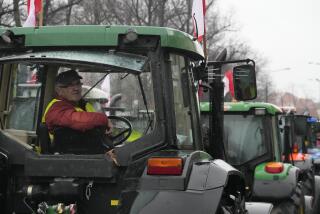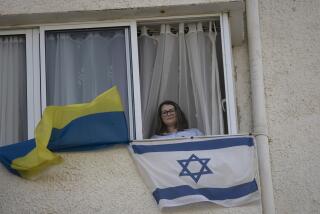Escape Tough as Bombs Fall in Chechnya
- Share via
SLEPTSOVSKAYA, Russia — The Russians consider the border with war-torn Chechnya open for refugees, and it is--for those who want to go back and brave the Russian bombs raining on the separatist republic. But for the desperate thousands waiting in a miles-long column to get out of Chechnya, the road to escape is effectively closed.
Of those thousands, only a trickle is being allowed to pass through to safety each day. The panic is rising: Two women were crushed to death Tuesday in the crowd of refugees at the border with the neighboring Russian republic of Ingushetia.
Even the wounded have trouble getting past the Russian military checkpoint.
Two sisters, Satsita and Malika Abdulayeva, both injured last week in bomb attacks east of the Chechen capital, Grozny, waited for five days before they were allowed through the Russian checkpoint into Ingushetia.
Lying on a bed in a hospital corridor in Sleptsovskaya, near the Chechen border, Satsita Abdulayeva, 28, said the column of people waiting to escape is about seven miles long. Other reports had the line stretching nine miles, and some estimates put the number of waiting refugees at up to 15,000.
The sisters, whose mother was killed in the bombing that left bits of shrapnel in their bodies, witnessed attacks by Russian planes that sent the column of refugees into panic.
“We saw it. There were attacks on the column,” Satsita said. “We were on the road waiting.”
Malika Abdulayeva, 30, said other injured people were trapped in the long line of refugees.
Russia closed the border Oct. 23, and despite an official reopening announcement Monday, only a few hundred people have passed through since.
Last month’s decision to close the border against a flood of refugees took the Chechen population by surprise, stranding husbands, wives and children on opposite sides of the border. Some refugees are so desperate that they’re prepared to go back into Chechnya to find partners, parents or children, risking bomb attacks and the possibility of being trapped there.
The mood at the Kavkaz border checkpoint in Ingushetia is one of near-hysterical anger and betrayal as powerless Chechens return to the checkpoint in the hope of finding relatives still trapped in Chechnya.
One man, among a few dozen who passed through the border checkpoint Monday, claimed that Russian soldiers would admit only those who could pay. “They were asking for money. If you can pay, you get out. They won’t take less than 1,000 rubles [about $40] per person,” said the man, who didn’t give his name.
“They won’t let my mother, who is 70 years old, out,” wept one hysterical woman.
But according to an Ingush official at the checkpoint, the border is “considered open” by the Russian side.
Late Monday afternoon, however, a Russian military official at the Kavkaz checkpoint said it was too late in the day to let people pass. “It will be dark in an hour,” he said. “If we let them through, they’ll sleep on the fields, you understand?”
One Chechen man retorted in response, “Well, why didn’t you open it at 9 a.m.?”
The problems on the border resulted in disaster Friday when Russian planes hit a marked Red Cross convoy, killing 27 people. The convoy had tried to go to Ingushetia but was forced to return because the border was closed.
Ingush President Ruslan S. Aushev said the situation at the Kavkaz checkpoint was out of control.
“I think that everything that has been organized here is yet another humiliation of peaceful civilians, of the refugees in the Chechen republic. This is arbitrary rule, pure and simple,” Aushev said.
Ingush officials say that, before the border closing, nearly 200,000 refugees fled the bombing of Chechen villages and now are housed in tents, train cars and private houses in Ingushetia.
Chechnya pronounced itself free of Russia in 1991, and three years later Russia unleashed a war to crush its independence bid. After 22 months of fighting that killed tens of thousands of people, the Russians were defeated and signed a peace deal.
Russia renewed the war against Chechnya after Muslim fundamentalist fighters based in Chechnya seized several villages in the neighboring Russian republic of Dagestan this summer and after several bomb attacks on Russian apartment blocks in September blamed on Islamic militants. The Russians responded with a furious campaign of bomb and rocket attacks against Chechen villages. Russian officials, however, continuously claim that only rebel bases are being attacked and that the only casualties are terrorists.
In Oslo, President Clinton took a scheduled break from a Middle East summit Tuesday to meet with Russian Prime Minister Vladimir V. Putin and stress the need for a peaceful, political solution in Chechnya, a senior administration official said.
Clinton said he recognized Russia’s territorial integrity but added that he was “very concerned” about the growing civilian casualties in the conflict.
Such casualties, Clinton told Putin, reduce the chances of a peaceful solution while also damaging Moscow’s international standing, according to the official.
There was no precedent in the 1994-96 war for a border closure. Although Russian troops blockaded villages then, sometimes trapping civilians inside as bombs fell, they never prevented families from fleeing Chechnya for Ingushetia.
On Tuesday morning at the Kavkaz checkpoint on the Ingush side of the border, women pleaded with Russian soldiers to admit the column of refugees. They carried white protest banners, but in vain. Only about 270 people made it through the checkpoint.
The Russian military refused to allow journalists to travel about a mile to where the column of refugees was waiting.
Although the border is described as being open, Russian troops have instituted strict security checks to prevent Chechen fighters from passing. But, as in much of the Russian military action aimed against guerrilla fighters in Chechnya, it is the civilians who suffer most.
“It’s criminal. They’re the terrorists, bombing civilians. They won’t even let bread trucks through. People there are hungry. People are dying on the road,” said one furious Chechen, whose family, including his wife and three children, is trapped in Chechnya. “I don’t know whether they’re alive or dead,” he said.
There was a line of vehicles Tuesday morning waiting to return to Chechnya. In it was Leche Ansarov, 40, who was going back to find family members. “It’s better to be buried in Chechnya,” he said angrily after waiting for more than a week for family members to join him in Ingushetia. “At least we don’t die in Russia.”
*
Times staff writer Edwin Chen in Oslo contributed to this report.
More to Read
Sign up for Essential California
The most important California stories and recommendations in your inbox every morning.
You may occasionally receive promotional content from the Los Angeles Times.













